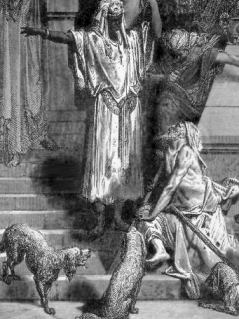
Click to see larger version
Context: This story follows a series of three parables in Luke 16—involving a lost sheep, a lost coin, and a lost son. The first labeled as such, the other two not, but all teaching that "there is much joy in heaven" over one sinner that is saved. But this saga of the rich man and Lazarus immediately follows the story of the Dishonest Steward, which teaches (not dishonesty, but) that men should make preparation now for the future. The Pharisees responded to Christ's lesson on preparatory stewardship by "deriding" Him. Jesus responded to their rejection of this principle by telling another parable.
But to introduce it, He reminds them that the Jewish nation had been priveledged to enjoy the instruction of "the law and the prophets," and since the ministry of John the baptist, they have also been blessed with the added light of the gospel. He then shows them what will be the consequence of not taking advantage of these opportunities during this life.
Message: There are two main characters—a rich man and a poor man. The parable contrasts the situation of both during this life and the next. The core message is that our conduct before death determines our bliss or misery after death; destiny is fixed at death. It then concludes that those who will not hear "Moses and the prophets" would not be persuaded to change their lives even "though one rose from the dead." Shortly after this, Jesus did raise one from the dead--Lazarus of Bethany (John 11). And not only were the Jewish leaders not persuaded to accept Christ, but they added Lazarus to their hit list.
Setting: A surreal picture where both characters can see and hear each other, yet are separated by a "great gulf" accross which no one can pass. Lazarus is depicted as being "in the bossom of Abraham." Jesus had previously described paradise as a place where "many" would come "from east and west" to "sit down with Abraham" and feast "in the kingdom of heaven." (Matt 8:11; Luke 14:15). The Jews at this time had come to view Abraham as their spiritual Father, and practically looked to him for salvation. They invision him as the one, like St. Peter is imagined today, who welcomes those who arrive at heaven's gate. To further emphasize the hypothetical quality of the story, Jesus choses the Greek term, Hades , to describe the place of punishment. This was the name used by Greek mythology when discussing the domain of Pluto, god of the underworld. Thus, when Jesus mentions "the bossom of Abraham" and the Hades of Pluto, it was similar to how we might start a story today with "There was a lawyer and minister who died and arrived at the pearly gates where St Peter said..." Such an introduction is clearly recognized as the prelude for a humerous joke, not a factual account of historical or doctrinal truth. Is the visual and audible proximity between heaven and hell literal or figurative? Is the "bossom of Abraham" literal or figurative? Is the "tip of Lazarus' finger" physical or spiritual? Would the water be literal? Is the rich man's tongue physical or spiritual? What kind of bodies do each have in heaven and hell? Is this before or after the resurrection? Such questions miss the point of the story.
Rewards:
Was Jesus making a point about when
the rewards of life are received? This
is not the theme of His previous discourses. A
conclusion that men experience heaven or hell at the moment of death contradicts
Christ's own testimony that "the Son of man shall...reward every man according
to his works" when He "shall come in the glory of his Father with his
angels" (Matt 16:27; 25:31-41; Rev 22:12) and His own teaching in the
parable of the wheat and the tares in Matt 13:39,40: "The harvest is the
end of the world...As therefore the tares are gathered and burned in the
fire; so shall it be in the end of this world." Further indication
is John chapter 6: four times Jesus promises those who the Father gives
Him, who believe on Him, who come to Him, who feed on Him that He will
"raise him up at the last day" (John 6:39, 40, 44, 54).
Communication: The rich man is unable to return to warn his brothers. Abraham will not allow Lazrus to go. This story would then teach that there is no communication from the spirits of the departed with the living. More than mere information, the appeal from the rich man is for a sign, evidence that there is an afterlife with consequences. The Jews also repeately asked Jesus for a sign of His authority. Sadly, when the greatest sign came, and the real Lazarus was raised to life just days later, it, too, was rejected.